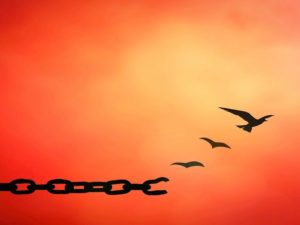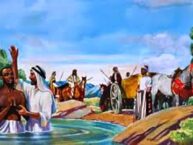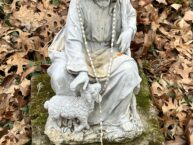 March 18, 2018: May God’s words alone be spoken, may God’s words alone be heard. Amen.
March 18, 2018: May God’s words alone be spoken, may God’s words alone be heard. Amen.
Here we are, on this final Sunday of Lent – a period in which we have reflected more closely on our relationship with God, our neighbor, our self. These next several days will mark the end of one part of our faith journey – when we, quieting down, became intentional in our faith practice – not out of obligation, or so I hope, but from a place of longing, of wanting to be in right relationship with God. Perhaps we do this now so that, as we enter into the chaos of Palm Sunday, the intensity of Maundy Thursday, and the despair of Good Friday, we are able to rest in the knowledge of God’s unconditional love for us. Love that we hear so clearly in the reading from Jeremiah.
In the passage we heard this morning, the law of the covenant between God and humanity has been relocated. It is no longer inscribed solely in stone, but on the hearts of all that God created. Right in our hearts, God has established a covenant of relationship – of love. But here is perhaps the most jaw dropping part of it all – something that is so difficult to consider – God also said “I will forgive their iniquity, and remember their sin no more.” I will forgive and forget.
Well, you would have to be God to do both, to be sure. Because for humans, forgiveness is not about forgetting, and that is okay. God, did not expect the same of us. Not exactly anyway. But before we dwell any more on this passage, I want us to take a look at the gospel.
Now, to begin with, this is a completely backward time for this passage – why? Because it happens immediately after Jesus enters into Jerusalem in that circus like parade on a donkey we will reenact next Sunday – yet we are hearing it today. And after that wild ride, two Greeks walk up to a disciple named Philip and say “Sir, we wish to see Jesus.” And they do.
Jesus then tells them, as he tells the disciples, what is to happen in the days to come. He tells them that the hour has come for him to complete his work, and describes what his death will mean. He says that “unless a grain of wheat falls into the earth and dies, it remains just a single grain; but if it dies, it bears much fruit. Those who love their life lose it, and those who hate their life in this world will keep it for eternal life.” Is Jesus telling them that they must die on a cross too? Again, like the passage from Jeremiah – no, not exactly.
There is a story I read once. A woman dreamed she walked into a brand-new shop in the marketplace and, to her surprise, found God behind the counter.
“What do you sell here?” she asked.
“Everything your heart desires,” said God.
Hardly daring to believe what she was hearing, the woman decided to ask for the best things a human being could wish for. “I want peace of mind and love and happiness and wisdom and freedom from fear,” she said. Then, as an after-thought, she added, “Not just for me. For everyone on earth.” God smiled and said, “I think you’ve got me wrong, my dear child. We don’t sell fruits here – only seeds.”[1]
Jesus isn’t asking those who follow him, to die with him – at least not physically. But he is saying that his death, his resurrection, will, as any seed planted in the earth, bring for new life. If we are to follow him, we must die too. But, if not with our lives, how?
It’s all about the seeds.
And seeds are dead bits plants cast off onto the earth. Seeds are the beginning of the roots of possibility, and the sprouts of new life.
God was and is always seeking to be in relationship with us – through covenant, through prophets, through Jesus. But relationship requires something of those involved – it requires some casting off – or dying, if we are ever to have any hope of that relationship having life. We must allow to die and fall to the ground anger, bitterness, jealousy, and hate. And the death of those things which destroy us will bring forth seeds – seeds of hope and trust, that once sowed in our hearts, and nourished by God’s grace – will sprout new life for ourselves, and for all those who know us. That is the death Christ calls us to – that is what it means to follow Jesus – that is what it means to lose our life for eternal life. Because it is this new life of love, of relationship with God and our neighbor, that is the root of our purpose on this Earth.
The gospel and the passage from Jeremiah are saying very much the same thing: God wants so desperately to be in relationship with us, to be in covenant with Her children, that She casts off the way in which we have pained one another – the way in which we have pained God – and forgives it all – not only forgives it, but forgets it too. And when that was not enough for us to understand who we are, and how we are to live, God becomes incarnate – enters into our humanity and dwells among us – knowing the cost. God does this not for atonement of sins – that had already been given us all long before – but to show us how to be. It is one thing to say to a child – you have done wrong, I forgive you – but what will that do, if we also do not model how they are to be? The child needs to be taught by example. It doesn’t mean that the child won’t do wrong ever again, but it does mean there is a hope that the child will follow in the example of the parent.
We are God’s beloved children – would God not do the same for us? Of course God would, and did, and always will. The God who forgives and forgets offers in Jesus an example of how to be – how to die to what holds us back from relationship – relationship with God, with our neighbor, and also with ourselves. To be sure, this isn’t an easy thing to do, nor is God asking us to forget, as we are not God, and in our humanity – forgiving is never about forgetting for us. Forgiving is about dying and new life, and it isn’t easy – or even possible for us all of the time. Yet when it is hard to for us to do, consider Scarlett Lewis.
Now, Lord knows, we have seen far too many school shootings. I think America lost its soul when nothing happened after the Newtown massacre of small children and some teachers. “Scarlett Lewis lost her 6-year-old son Jesse in the shooting at Sandy Hook Elementary School. He was one of 20 children killed in that horrific attack in 2012 — an absolute nightmare come to life. Parents such as Scarlett were devastated.
At first, her anger sapped all of her energy and strength. Her rage was directed at the shooter and also at the mother who unwittingly armed him.” I can definitely understand that – and would have felt the same way, to be sure. “But then Scarlett Lewis made the choice to forgive. “Forgiveness felt like I was given a big pair of scissors,” she told The Forgiveness Project. Those scissors helped her to cut her tie to the shooter and regain her personal power. “It started with a choice,” she said, “and then became a process.” At her son’s funeral, she urged mourners to change their angry thoughts into loving ones. She saw this shift as a way to change the world.”
While I don’t know Ms. Lewis personally, I can guarantee you she has not forgotten what happened on that fateful day – nor would anyone, least of all God, expect her too. But what she did do was add one death on top of that of her son’s. The death of anger, hate, bitterness, and fear. And the seeds of forgiveness were planted as a result. The growth that sprang forth for her, and for all who knew her, was a new plant of hope and love. And I do believe it is people like her that will change the world.
Many of us will struggle to ever get to where Scarlett Lewis was able to go, where Jesus calls us to go. That’s okay too. There’s a proverb of 12 step programs that says “Fake it till you make it.” Sometimes we just need to toil in the soil of faking our forgiveness, until we reach that place where it becomes a true seed planted in the ground. Remember – Scarlett Lewis talked about it being a process – it is. And sometimes that “faking it” lasts a lifetime, but in the act of trying, we have already begun to die to what holds us back from relationship.
To be sure – it is not always another person that is the object of our hatred, our bitterness, our anger. It is sometimes God too. And that too is okay. I may have told you this before, but when I was very angry with God in a dark time in my life, a nun told me “Oh, don’t worry. God can handle it.” And God can indeed handle it when we feel lost, pained by what we are going through – when we feel that God has betrayed or abandoned us. God hasn’t, of course, but sadly poor theology that makes God out to be a cosmic scientist with all of us as rats in God’s laboratory maze, can leave a person asking “Why did God do this?” or “Why didn’t God keep this from happening?”
But that is not a God that I could serve. I could never serve a God who would go through a pediatric cancer ward and say “you’ll die” “you’ll live.” Nor did God decide a shooter should enter any school or church and murder innocent people either. God, the God Jesus showed to us, is the one that was with Scarlett Lewis, giving her strength to meet the days ahead, and guiding her to forgiveness – not for the shooter’s behalf, but for herself.
God modeled forgiveness in Jeremiah for the same reason that God became incarnate in Jesus – that we might be in relationship with God. That in that relationship, we will come to understand the life we are called to live, and what we are to die to in order to live it. And there’s another reason forgiveness is God’s hope for us too.
You know, I always like Oscar Wilde’s take on forgiveness “Always forgive your enemies; nothing annoys them so much.” But, I don’t think that is exactly what God had in mind. I think maybe God was modeling something deeper – something that God knew was the key to it all for us – that holding on to anger, bitterness, and hatred imprisons us in our resentment. If we can’t let those things die, it isn’t the other person who is harmed – it is us. Or, as Nelson Mandela, who truly understands what it is like to be imprisoned, who had every right to be resentful for the injustices done to him, put it “Resentment is like drinking poison and then hoping it will kill your enemies.” Mandela was a human model of God’s forgiveness in this world in the way in which he responded to what had been done to him, and to his brothers and sisters in South Africa – and as a result of letting his resentment die, he led all the people of his country to new life.
And it is for this way of living that God builds covenant with us through forgiveness, and through Jesus’ life, death, and resurrection – modeling the death we each must do to plant the seeds of new life – the life of relationship with God, with one another, with ourselves. The life that offers hope to the world.
With all that in mind, I ask you now to close your eyes for a moment. Close your eyes, and “call to mind and hold onto one difficult memory of something you wished that God would forgive and forget: an unkind word or deed of which you feel ashamed, perhaps. And while holding on to that… call to mind also and hold onto one thing you wish you could forgive and forget: some slight or hurt or betrayal or disappointment that continues to prey upon you.
And now that you have those two things in mind — imagine holding them in each of your hands. Hold them there, and then, when you are ready, let go of the thing you wished God would forgive and forget because, indeed, God already has.” Now open your eyes.
In the coming days, as we move toward Holy Week “perhaps you can also explore the thing you wish you could forgive and forget – and realize that you are human, and forgetting is not the point – forgiving is. So perhaps you might this week begin to die to what holds you back from forgiveness instead. This is not a demand, but an invitation. You can choose to RSVP no. That is your choice. And to be sure, some things are just too deeply painful to get there – and that’s okay too – none of us are God. But it is an invitation to try, to even fake it till you make it, that perhaps, by God’s grace, you will no longer be held captive to that pain.”[2]
As we enter Holy Week next Sunday, may we hold something else too – this time, in our hearts. May we hold in our hearts the knowledge that death is not to be feared, but for our souls, it is needed, that we may truly live – because we know that each of us, all who follow Christ, follow in his death and in his resurrection. And in that death, we will plant seeds of love and hope for a world imprisoned in darkness, perhaps even freeing ourselves too.
Amen.
For the audio from the 10:30am service, click here, or subscribe to our iTunes Sermon Podcast:
[1] De Mello, Anthony. Taking Flight, A book of Story Meditations. p. 103.
[2] Paraphrased from the idea and words of David Lose on davidlose.net.
The Rev. Diana L. Wilcox
Christ Church in Bloomfield & Glen Ridge
March 18, 2018
Lent 5
1st Reading – Jeremiah 31:31-34
Psalm 119:9-16
2nd Reading – Hebrews 5:5-10
Gospel – John 12:20-33






